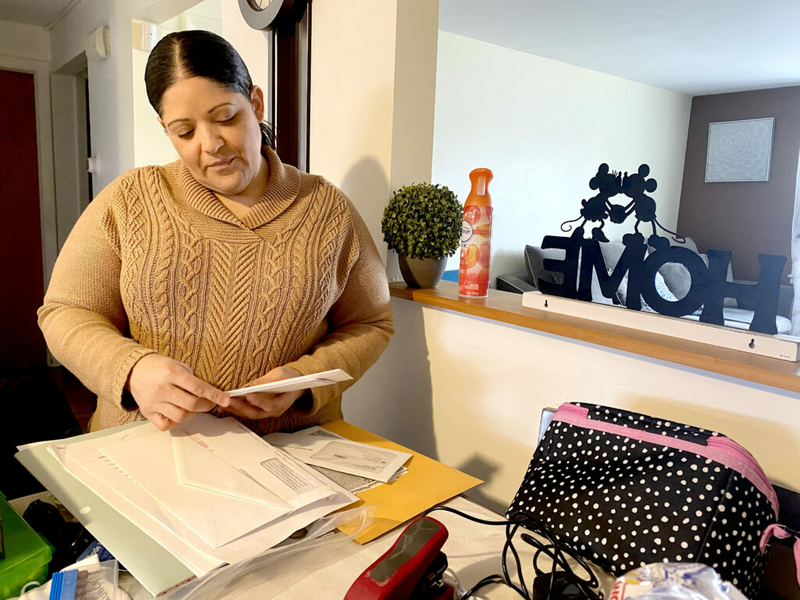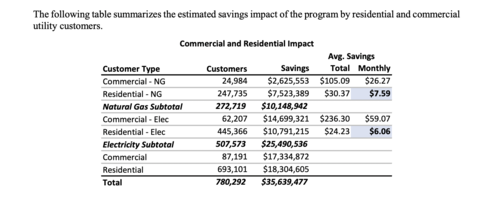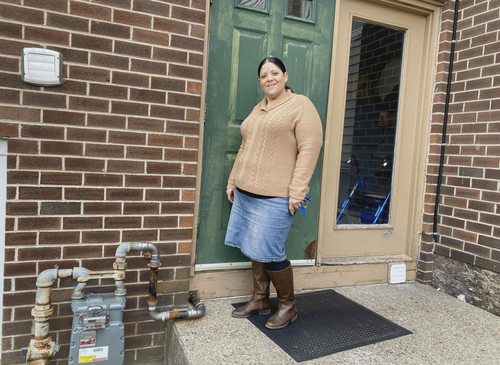Households struggle as legislation for utility rate relief stalls

A $54 energy bill rebate might not seem like much. But for Erika Gonzalez, every little bit helps.
Especially this year, with record rate hikes tripling electricity costs for her Pawtucket condo, from $60 to $180, just as her husband got laid off from his warehouse job.
Left with her $17,000 take-home pay as a part-time organizer for the George Wiley Center, the family has cut back to keep the lights on.
Cable bills and payments on her $105,000 in student loans sit unattended. Extras at the grocery store or for personal luxuries are out.
It’s hardest saying “no” to her 16-year-old son, Ethan.
“I have been stressed, frustrated,” Gonzalez, 43, said. “I have cried at times.”
Consumer advocates warned of this very scenario, calling on state regulators and lawmakers to stop last fall’s rate hikes from going through. The Rhode Island Public Utilities Commission approved them anyway, though the increases were coupled with a string of bill credit and discount programs aimed at softening the blow.
Gov. Daniel J. McKee during his reelection campaign pledged to fast-track a law change in the 2023 legislative session that would give customers more help with winter energy bills. His fiscal 2023 supplemental budget, introduced in January, includes $35.6 million to offer retroactive rebates on the 7% combined gas and electricity taxes for a four-month period from December through March.
But the urgency characterizing his election promise has faded.
House Finance Chairman Marvin Abney, a Newport Democrat, introduced a bill based on McKee’s rebate proposal. The legislation was held for further study in the House Finance Committee after a Feb. 8 hearing. No companion bill has been introduced in the Senate as of March 17.

And Rhode Island Energy is pushing back, citing logistical and administrative challenges with retroactive bill credits and potential constitutional violations, according to written testimony from Nicholas Ucci, director of government affairs. Ucci instead urged lawmakers to consider applying the tax relief to next winter’s energy bills, when rates are expected to rise even further.
That doesn’t do much for Gonzalez now, or the many other families struggling to balance rising rent, groceries and energy bills this winter.
“There is still a perfect storm when it comes to housing and lack of affordability and inflation,” said Camilo Viveiros, executive director for the George Wiley Center, a nonprofit social services agency in Pawtucket. “Utilities very much play a part in that.”
Pleas for help from families on the rise
Even with the $39.3 million doled out in one-time winter electric bill credits – using state gas cap-and-trade revenue plus funds from the state settlement with Rhode Island Energy parent company PPL Corp. – the Wiley Center has been bombarded with pleas for help from families facing eviction, Viveiros said.
Viveiros supported the tax rebate, which translates to a $54 savings for the average residential gas and electric customer, and $341 in savings for the average commercial customer, according to analysis from the governor’s office. But he also called for more systemic changes to the way the state and its primarily utility operator set rates for customers.
“We are at a point where we are going to see rising energy prices year after year, and we can’t just let them be rubber-stamped,” said Rep. David Morales, a Providence Democrat.
Morales accused Rhode Island Energy of prioritizing its shareholders over consumers, insisting utilities are a basic service and should be affordable. Morales has repeatedly called for the state’s utility operator to absorb, rather than pass on, some of the costs in electricity and natural gas it buys from third-party suppliers.
We are at a point where we are going to see rising energy prices year after year, and we can’t just let them be rubber-stamped.
Rhode Island Energy in an emailed response to Morales’ accusations said that the higher winter rates were the result of economic conditions beyond the company’s control.
The operator buys energy from third-party suppliers, looking for the lowest competitive rate, and passes those prices onto customers “without markup or profit,” Ted Kresse, company spokesman, said in an email.

Lawmakers propose discount plan
Meanwhile, some state lawmakers are looking to enact a Percentage Income Payment Plan to help low-income residents pay on their energy bills, following the model used in more than a dozen other states.
Bills introduced in the House and Senate by Rep. Scott Slater and Sen. Susan Sosnowski would require major utility operators to create a discount plan in which low-income ratepayers – earning less than 150% of federal poverty guidelines – pay 3% to 6% of their income on gas and electricity.
Slater, a Providence Democrat, has introduced similar legislation in years past, but failed to muster votes to get it off the ground. Slater was optimistic the outcry over recent energy rate hikes would fuel support this time around.
“I have definitely heard a lot from folks in my district that they are walking a tightrope with their energy bills,” Slater said. “And I know my colleagues are hearing the same things. I am hoping that momentum will get us over the finish line.”
Committee hearings on the companion bills had not been scheduled as of March 16.
McKee’s office did not respond to inquiries for comment about his support for the PIPP bill. However, in an emailed statement, the governor’s office said passing the legislation regarding the rebates on gas and electricity taxes remains a “top priority.”
“The goal is to get it passed as soon as possible,” Olivia DaRocha, a spokesperson for McKee’s office, said in an emailed response.
Gonzalez was frustrated it hadn’t happened yet.
“These lawmakers need to step up their game, because next thing they know, it could be them struggling,” she said.








